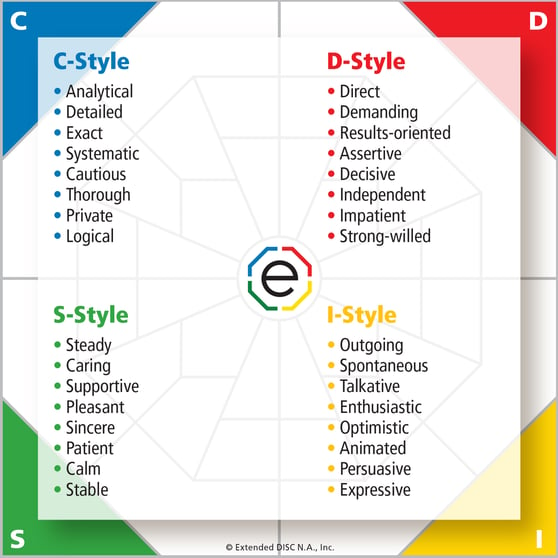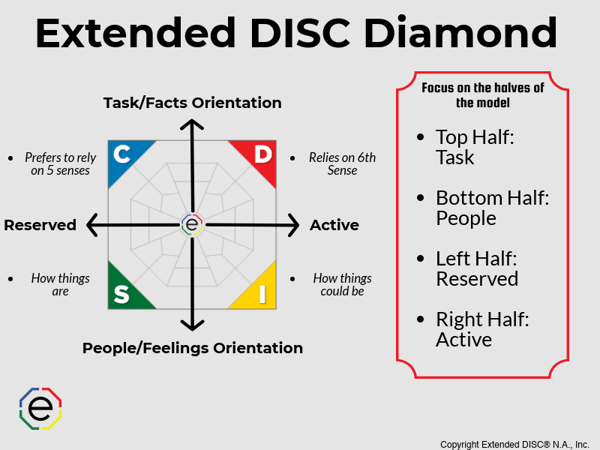How often have you heard people interchange personality tests with behavioral assessments? Do you know the difference?
We've all heard people say they've taken a personality or DISC assessment, but is that what they really took? There are clear differences between behavioral assessments and personality tests that we should be able to explain to our clients.
What's the difference between behaviors and personality?
![]() Personality refers to 'individual differences in characteristic patterns of thinking, feeling and behaving'; your uniqueness and differences from all others. Personality tests are closely associated with psychometrics tests. They tend to be standardized measures including personality profiles, reasoning tests, and competence testing. Personality tests may not measure natural style. They try to identify your responses to questions concerning your feelings, thoughts, and behaviors, in order to quantify your personality.
Personality refers to 'individual differences in characteristic patterns of thinking, feeling and behaving'; your uniqueness and differences from all others. Personality tests are closely associated with psychometrics tests. They tend to be standardized measures including personality profiles, reasoning tests, and competence testing. Personality tests may not measure natural style. They try to identify your responses to questions concerning your feelings, thoughts, and behaviors, in order to quantify your personality.
Your behaviors, generally speaking, are what are displayed externally and observed in you by others. They describe your preferred and most comfortable ways of doing things. Furthermore, your natural behaviors, to an extent, are within your control. Natural behaviors require the least amount of energy from you, are the least stressful, and allow you to behave most effectively in a longer period of time.
A simplistic way to think about personality versus behaviors is your personality is more about 'what you are,' whereas, behaviors are about 'what you do.' DISC tools fall under the behavioral assessment category. DISC focuses on behaviors because behaviors are things about yourself you can adjust to be more successful.
Let's take a step back and briefly look at the DISC model.
What is DISC?
The DISC Model identifies our preferred behaviors based on how we react in different environments. It explains how we prefer to do things, how we tend to interact with others, and how we are observed by others. DISC focuses on behaviors because we can control and change our behaviors to be more successful.
 There are four main behavioral styles we identify as D-style, I-style, S-style, and C-style. DISC has no value judgement of good or bad, better or worse. All of the styles have strengths and areas of development. Each of us have our own unique combination of styles that feels more comfortable and some that take more energy.
There are four main behavioral styles we identify as D-style, I-style, S-style, and C-style. DISC has no value judgement of good or bad, better or worse. All of the styles have strengths and areas of development. Each of us have our own unique combination of styles that feels more comfortable and some that take more energy.
Why does DISC focus on behaviors?
DISC helps us understand our natural behavioral style so we can better decide how to adapt them to improve our interactions. It's not always easy to adjust, but if we identify our natural preferences, then we have strong data to make the right adjustments. We have more insight into our behavioral strengths, how we tend to behave under pressure, how we prefer to communicate, etc.
While DISC focuses on our natural behaviors, it's also critical to know what DISC does not measure. It does not measure our attitude, values, skills, intelligence, etc. Therefore, it cannot be the sole criterion for making decisions about oneself. DISC provides supporting information to help in our self-development.
Why use DISC?
 People often use DISC because it is simple and easy to learn. Clients mention its simplicity as one of its major strengths. Our jobs are challenging enough, right? Unlike other tools, DISC is easy to remember. Even years from now, you're likely to at least remember your primary DISC style and you'll likely be able to identify the main DISC style of others. When something is complicated, we know our clients are less inclined to use it.
People often use DISC because it is simple and easy to learn. Clients mention its simplicity as one of its major strengths. Our jobs are challenging enough, right? Unlike other tools, DISC is easy to remember. Even years from now, you're likely to at least remember your primary DISC style and you'll likely be able to identify the main DISC style of others. When something is complicated, we know our clients are less inclined to use it.
Another, often mentioned, strength of DISC is its practical approach to improving communication. If it's easy to learn and to practice, then our clients are much more likely to use it. Essentially, the concept of DISC is something we already know and use; we just don't use the DISC terminology. We know how we tend to interact with others, 'I'm a talker' or 'I'm a listener'. We may take into account how others prefer interacting with us, 'they're talkative' or 'they're quiet'. In addition, we may adjust our style like talking slower or being chattier. Where we can get into trouble is when we don't consistently practice these adjustments.
We are helping our clients make DISC a common language that everyone communicates with. It helps them understand how they prefer to do things, but also to recognize when their natural style doesn't work. Hence, we are building our situational awareness; how we tend to show up in different situations. We all have roles and responsibilities that are outside of our comfort zone. If we are able to recognize them, then we can practice and develop our behaviors to be better equipped to succeed.
DISC helps us maximize our interactions so we don't rely solely on our most comfortable behaviors. It's a great reminder of what we do well and to do it consistently. Specifically, we should be more self-aware of our style and how we come across to others, so we can effectively make those brief and temporary adjustments.
Not all DISC tools are the same
DISC belongs in the public domain; no one owns DISC or the DISC model. However, different companies have their own proprietary tools based on DISC. What they all share in common is the foundation of the DISC Model; how the four DISC styles are described. This is where the similarities often end.
The Extended DISC® Tool focuses on natural hard-wired style; who you truly are based on your subconscious self. The Tool takes the best of both worlds. It provides more “horsepower” to identify who you truly are, while maintaining the user-friendliness of the DISC Model.
There are some DISC tools that only focus on adjusted style aka role style. Your role style is based on who you feel you need to be in your current role or who you need to bring to work to succeed. They are based on the person's ideal behaviors; who they want to be. It requires adjustment. So, it's more of your 'ideal profile' versus who you truly are.
Maximizing your DISC Assessment results
 Your success in life, both professional and personal, is largely determined by how well you interact with others. These interactions can be effortless and easy. They can also be frustrating, require a lot of effort, and end up with less than desired results. Your DISC assessment provides a personalized map of your natural style. It predicts how you prefer to do things and what tends to happen when you don't make adjustments to your style.
Your success in life, both professional and personal, is largely determined by how well you interact with others. These interactions can be effortless and easy. They can also be frustrating, require a lot of effort, and end up with less than desired results. Your DISC assessment provides a personalized map of your natural style. It predicts how you prefer to do things and what tends to happen when you don't make adjustments to your style.
In summary, DISC focuses on behaviors versus your personality because you can make continuous changes to them. Your increased self-awareness, coupled with knowing the behavioral preferences of the person you're interacting with, lets you build and sustain better outcomes in your daily interactions.

